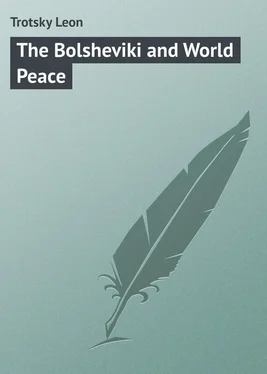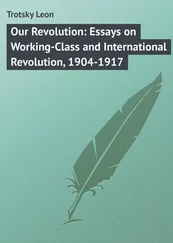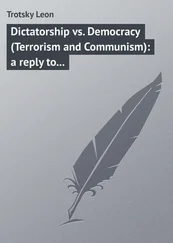Leon Trotsky - The Bolsheviki and World Peace
Здесь есть возможность читать онлайн «Leon Trotsky - The Bolsheviki and World Peace» — ознакомительный отрывок электронной книги совершенно бесплатно, а после прочтения отрывка купить полную версию. В некоторых случаях можно слушать аудио, скачать через торрент в формате fb2 и присутствует краткое содержание. ISBN: , Жанр: foreign_language, Русская классическая проза, на английском языке. Описание произведения, (предисловие) а так же отзывы посетителей доступны на портале библиотеки ЛибКат.
- Название:The Bolsheviki and World Peace
- Автор:
- Жанр:
- Год:неизвестен
- ISBN:http://www.gutenberg.org/ebooks/40273
- Рейтинг книги:4 / 5. Голосов: 1
-
Избранное:Добавить в избранное
- Отзывы:
-
Ваша оценка:
- 80
- 1
- 2
- 3
- 4
- 5
The Bolsheviki and World Peace: краткое содержание, описание и аннотация
Предлагаем к чтению аннотацию, описание, краткое содержание или предисловие (зависит от того, что написал сам автор книги «The Bolsheviki and World Peace»). Если вы не нашли необходимую информацию о книге — напишите в комментариях, мы постараемся отыскать её.
The Bolsheviki and World Peace — читать онлайн ознакомительный отрывок
Ниже представлен текст книги, разбитый по страницам. Система сохранения места последней прочитанной страницы, позволяет с удобством читать онлайн бесплатно книгу «The Bolsheviki and World Peace», без необходимости каждый раз заново искать на чём Вы остановились. Поставьте закладку, и сможете в любой момент перейти на страницу, на которой закончили чтение.
Интервал:
Закладка:
The present War signalizes the collapse of the national states. The Socialist parties of the epoch now concluded were national parties. They had become ingrained in the national states with all the different branches of their organizations, with all their activities and with their psychology. In the face of the solemn declarations at their congresses they rose to the defense of the conservative state, when imperialism, grown big on the national soil, began to demolish the antiquated national barriers. And in their historic crash the national states have pulled down with them the national Socialist parties also.
It is not Socialism that has gone down, but its temporary historical external form. The revolutionary idea begins its life anew as it casts off its old rigid shell. This shell is made up of living human beings, of an entire generation of Socialists that has become fossilized in self-abnegating work of agitation and organization through a period of several decades of political reaction, and has fallen into the habits and views of national opportunism or possibilism. All efforts to save the Second International on the old basis, by personal diplomatic methods and mutual concessions, are quite hopeless. The old mole of history is now digging its passageways all too well and none has the power to stop him.
As the national states have become a hindrance to the development of the forces of production, so the old Socialist parties have become the main hindrance to the revolutionary movement of the working class. It was necessary that they should demonstrate to the full their extreme backwardness, that they should discredit their utterly inadequate and narrow methods, and bring the shame and horror of national discord upon the proletariat, in order that the working class might emancipate itself, through these fearful disillusionments, from the prejudices and slavish habits of the period of preparation, and become at last that which the voice of history is now calling it to be-the revolutionary class fighting for power.
The Second International has not lived in vain. It has accomplished a huge cultural work. There has been nothing like it in history before. It has educated and assembled the oppressed classes. The proletariat does not now need to begin at the beginning. It enters on the new road not with empty hands. The past epoch has bequeathed to it a rich arsenal of ideas. It has bequeathed to it the weapons of criticism. The new epoch will teach the proletariat to combine the old weapons of criticism with the new criticism of weapons.
This book was written in extreme haste, under conditions far from favorable to systematic work. A large part of it is devoted to the old International which has fallen. But the entire book, from the first to the last page, was written with the idea of the New International constantly in mind, the New International which must rise up out of the present world cataclysm, the International of the last conflict and the final victory.
LEON TROTZKY.
CHAPTER I
THE BALKAN QUESTION
"The War at present being waged against Russian Czarism and its vassals is dominated by a great historic idea. The impetus of this great historic idea consecrates the battlefields of Poland and of Eastern Russia. The roar of cannon, the rattling of machine guns, and the onrush of cavalry, all betoken the enforcement of the democratic programme for the liberation of the nations. Had Czarism, in league with the French capitalistic powers and in league with an unscrupulous 'nation of shopkeepers,' not succeeded in suppressing the Revolution of 1905, the present slaughter of the nations would have been avoided.
"A democratic Russia would never have consented to wage this unscrupulous and futile War. The great ideas of freedom and justice now speak the persuasive language of the machine gun and the sword, and every heart susceptible of sympathy with justice and humanity can only wish that the power of Czarism may be destroyed once for all, and that the oppressed Russian nationalities may again secure the right to decide their own destinies."
The above quotation is from the Nepszava of August 31, 1914, the official organ of the Socialist party of Hungary. Hungary is the land whose entire inner life was erected upon the high-handed oppression of the national minorities, upon the enslavement of the laboring classes, upon the official parasitism and usury of the ruling caste of large landowners. It is the land in which men like Tisza are masters of the situation, dyed-in-the-wool agrarians, with the manners of political bandits. In a word, Hungary is a country closest of kin to Czar-ruled Russia.
So what is more fitting than that the Nepszava , the Socialist organ of Hungary, should hail with outbursts of enthusiasm the liberating mission of the German and Austro-Hungarian armies? Who other than Count Tisza could have felt the call to "enforce the democratic programme for the liberation of the nations"? Who was there to uphold the eternal principles of law and justice in Europe but the ruling clique of Budapest, the discredited Panamists? Would you entrust this mission to the unscrupulous diplomacy of "perfidious Albion," to the nation of shopkeepers?
Laughter turns away wrath. The tragic inconsistencies of the policies followed by the International not only reach their climax in the articles of the poor Nepszava; they disarm us by their humor.
The present series of events began with the ultimatum, sent to Servia by Austria-Hungary. There was not the slightest reason why the international Social Democracy should take under its protection the intrigues of the Serbs or any other of the petty dynasties of the Balkan Peninsula. They were all endeavoring to hide their political adventures under the cloak of national aspirations. We had still less cause to lash ourselves into a state of moral indignation because a fanatic young Serb responded to the cowardly, criminal and wily national politics of the Vienna and Budapest government authorities with a bloody assassination. 1 1 It is noteworthy that these opportunistic Austrian and German Socialists are now writhing with moral indignation over the "treacherous assassination at Sarajevo." And yet they always sympathized with the Russian terrorists more than we, the Russian Social Democrats, did, who are opposed on principle to the terroristic method. Lost in the mist of chauvinism, they can no longer see that the unfortunate Servian terrorist, Gavrilo Prinzip, represents precisely the same national principle as the German terrorist, Sand. Perhaps they will even ask us to transfer our sympathies from Sand to Kotzebue? Or perhaps these eunuchs will advise the Swiss to overthrow the monuments erected to the assassin Tell and replace them with monuments to the Austrian governor, Gessler, one of the spiritual forerunners of the murdered archduke?
Of one thing we have no doubt. In the dealings between the Danube Monarchy and the Servian government, the historic right, that is to say, the right of free development, rests entirely with Servia, just as Italy was in the right in the year 1859. Underneath the duel between the imperial police scoundrels and the terrorists of Belgrade, there is hidden a far deeper meaning than merely the greed of the Kareorgoievitches or the crimes of the Czar's diplomacy. On one side were the imperialistic claims of a national state that had lost its vitality, and on the other side, the strivings of the dismembered Servian nation to reintegrate itself into a national whole and become a living vital state.
Is it for this that we have sat so long in the school of Socialism to forget the first three letters of the democratic alphabet? This absolute lapse of memory, moreover, made its appearance only after the fourth of August. Up to that fatal date the German Marxists showed that they knew very well what was happening in Southeastern Europe.
Читать дальшеИнтервал:
Закладка:
Похожие книги на «The Bolsheviki and World Peace»
Представляем Вашему вниманию похожие книги на «The Bolsheviki and World Peace» списком для выбора. Мы отобрали схожую по названию и смыслу литературу в надежде предоставить читателям больше вариантов отыскать новые, интересные, ещё непрочитанные произведения.
Обсуждение, отзывы о книге «The Bolsheviki and World Peace» и просто собственные мнения читателей. Оставьте ваши комментарии, напишите, что Вы думаете о произведении, его смысле или главных героях. Укажите что конкретно понравилось, а что нет, и почему Вы так считаете.











